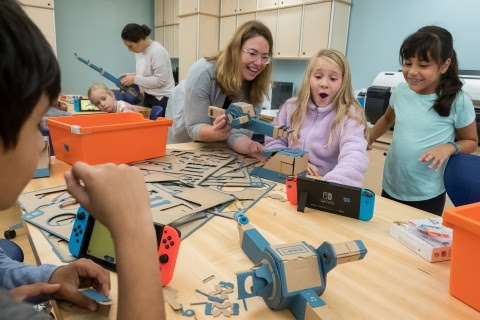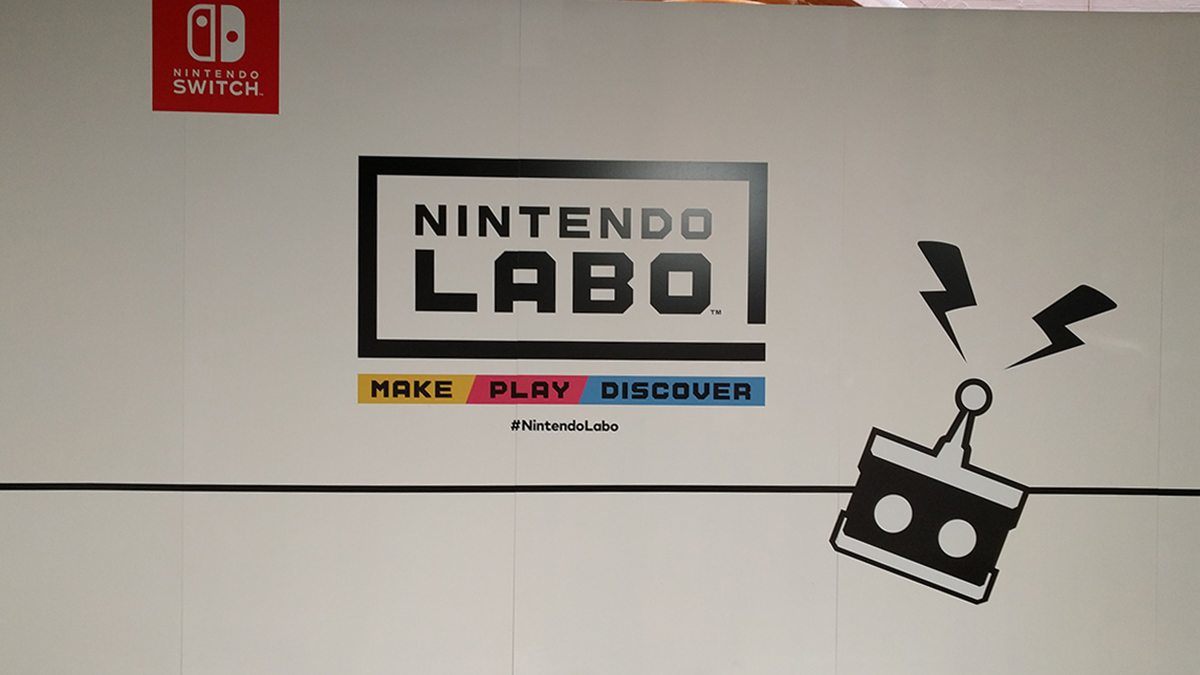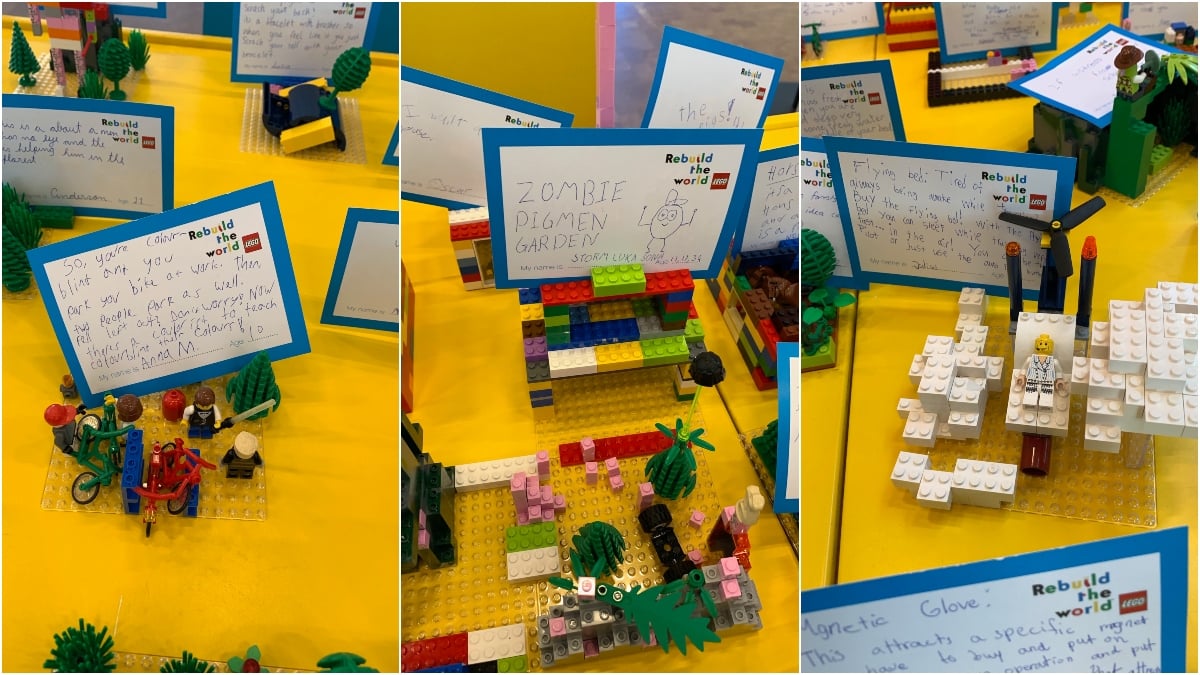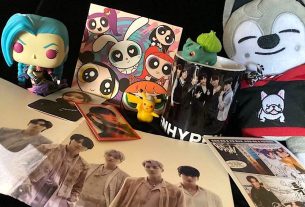
From the first moment that I sat down to work on the Nintendo Labo RC car, part of the Labo Variety Kit, the education possibilities were clear to me.
The Labo kits teach cooperative work. They teach step-by-step problem-solving. They have a maker element in showing kids how things are constructed, which rely on engineering principles. And, at the final step, there are elements of computer programming in the Toy-Con Garage, which can connect the various Labo kits, customizing them for additional fun.
Those education possibilities are about to become a reality for elementary school children.
Nintendo announced this week that a pilot educational program, conducted by The Institute of Play, is going on right now with the Labo Toy-Con kits in the greater New York area. The pilot program is part of a broader North American initiative to introduce Nintendo Labo in different educational settings across the nation.
From Nintendo’s press release:
Nintendo and the Institute of Play will then use the pilot program to develop a Nintendo Labo Teacher Guide that teachers can follow to implement the program in their own classrooms. Once the pilot is complete, it will expand to approximately 100 schools across the U.S. for the 2018-2019 school year.
The Institute of Play is a specialized nonprofit research and design organization that includes an interdisciplinary team of educators, researchers, game designers, and school leaders.
“We are always on the lookout for new tools and technologies that combine the best of learning with the spirit of play, and in Nintendo Labo, we found an inspiring and innovative approach in both areas,” said Arana Shapiro, Co-Executive Director of the Institute of Play. “Teachers in the pilot program are already seeing the natural fit for Nintendo Labo in the classroom, and now we can bring that dynamic to schools across the country.”
Nintendo will provide Nintendo Labo: Variety Kits and Nintendo Switch systems to participating classrooms. The program aims to reach approximately 2,000 students ages 8 to 11 during the 2018-2019 school year.

Nintendo debuted the Labo kits in April and, since then, people have been applying the tools and technology in the kits to make their own creations, including musical instruments and analog clocks. These amateur inventors are using the Toy-Con Garage mode, which introduces basic principles of programming.
“These creations and the talented users that thought them up are what inspired Nintendo to develop this collaborative program,” Nintendo said in their press release.
The Nintendo Labo Variety Kit includes a Fishing Rod, Piano, RC Car, Motorbike, and a House. There are also separate kits for an interactive Robot and a Vehicle Kit.
The proposed Nintendo Labo Teacher Guide will include sample lesson plans and learning modules dedicated to basic elements of STEAM and the “Make, Play, and Discover” components of Nintendo Labo. The guide will be available for free later this fall to anyone who wants to incorporate Nintendo Labo into their classrooms or homes.
Note: Free to anyone, for any homeschoolers wishing to incorporate these into their home lessons.
More information from Nintendo’s press release:
Once the pilot is complete, the program will expand to approximately 100 schools across the United States. Schools that wish to take part in the program can apply at http://instituteofplay.org/nintendolabo. Each participating school will be provided with Nintendo Switch systems and Nintendo Labo: Variety Kits, as well as the Nintendo Labo Teacher Guide. The in-classroom program will run through March 2019.
This program is part of a broader North American initiative to introduce Nintendo Labo in different educational settings. In Canada, Nintendo is partnering with Actua, Canada’s leading education-outreach organization for STEM topics, to inspire Canadian youth to be the innovators of tomorrow through digital literacy programs that offer hands-on experience with new and emerging technologies like Nintendo Switch and Nintendo Labo.
“The ingenuity of Nintendo Switch brings Nintendo Labo to life to provide a fun way for kids to explore basic STEAM topics together and be entertained while building a fundamental understanding of the technology behind them,” said Nintendo of America President and COO Reggie Fils-Aime.
“We hope our programs in the United States and Canada encourage kids to explore, tinker, problem-solve, and, in the process, get excited about design and technology—all while having fun.”





I appreciate that you have written a perfect and informative article, I learned a lot from it. I think that managing such a program reflects the responsibility of management and choose essay writer services to get quality task. I urge you to continue sharing media articles and blogs with people who are aware of the various events.
Have you been feeling under the weather lately? Try and get some rest and don’t worry about UK essays. Our service Crowd Content has recruited a brilliant team of a qualified college essay writer who provides excellent content before deadlines. Since we understand that most students can’t afford expensive services, we ensure that our price range is affordable for people coming from all walks of life.
At that point proceed onward to the following assertion tutoring services. This expands development while understudies practice their talking and listening abilities, alongside their scholastic language.